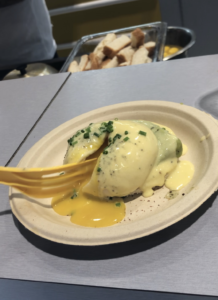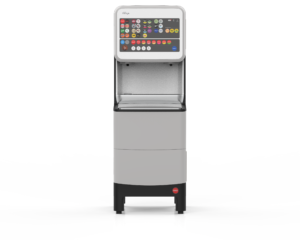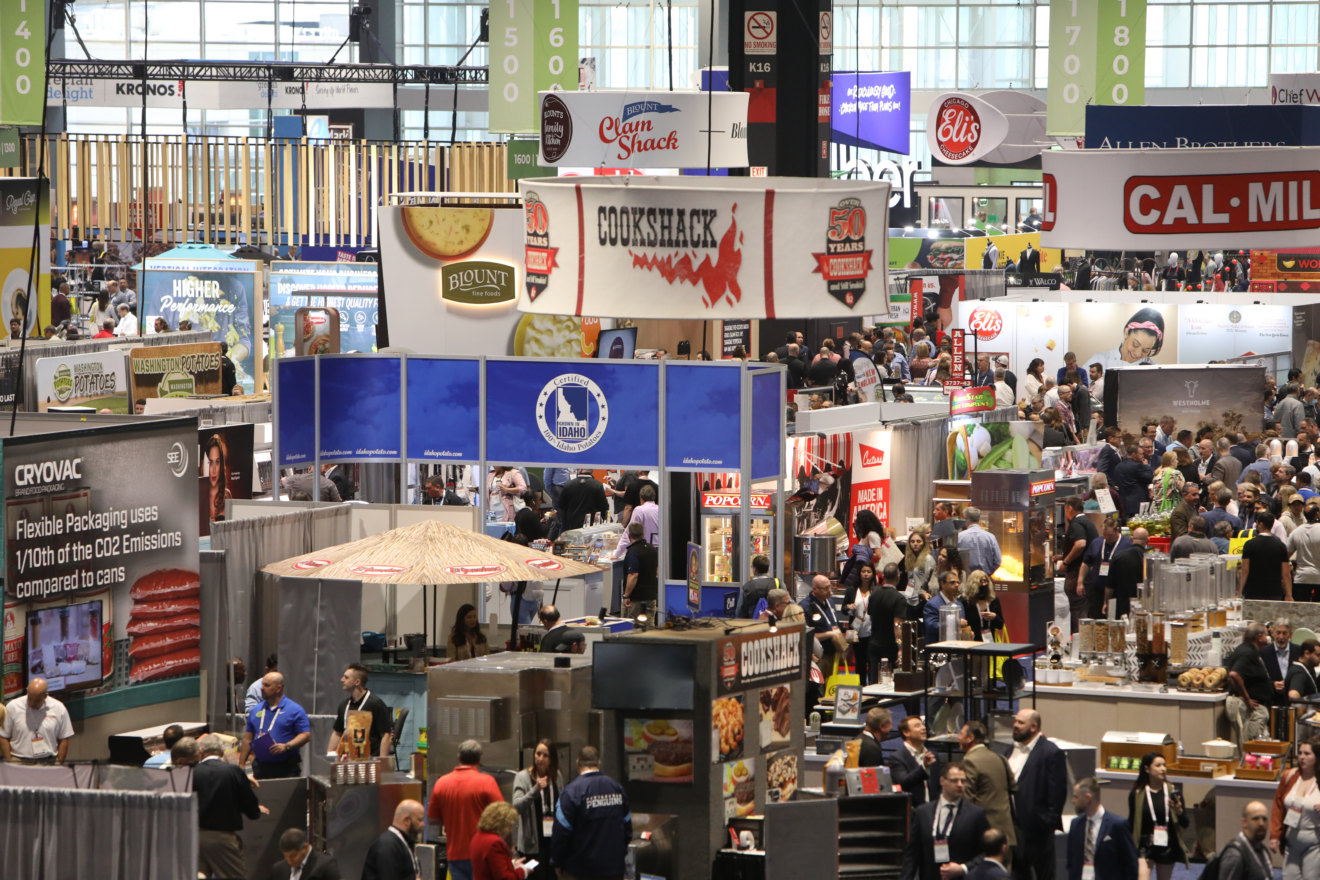Sign up for Restaurant SmartBrief today, free.
Plant-based poultry and egg alternatives, sustainable packaging items and technology tools aimed at reducing labor needs were among the top trends on the show floor at this year’s National Restaurant Association Show. More than 1,800 exhibitors gathered in Chicago last month for the event, which resumed after a two-year hiatus. Here’s a look at some of the products and companies that stood out:
Plant-based foods go beyond beef
When it comes to meatless burgers, the beef alternatives from Impossible Foods and Beyond Meat are basically the Coke and Pepsi of the plant-based world. While there were still plenty of plant-based burger options on display at the show, many companies seemed to be throwing their hats in the ring in hopes of taking the top spot in two other categories: chicken and egg alternatives.
TiNDLE, a plant-based chicken product from Next Gen Foods, took home a FABI Award this year, and the brand showed off its soy protein-based nuggets and chicken burger patties. Patty formats were a hot topic among companies offering plant-based chicken products. Many brands showed off nugget shapes at the show, but said they plan to debut patties soon to help operators take advantage of the popularity of fried chicken sandwiches.

Daring, another soy protein-based chicken alternative, offers both original and breaded varieties of its “chicken pieces” product, and Regional Sales Manager Derrick Harding said the company will debut a patty in the next month-and-a-half. Simulate, which makes wheat- and soy-based Nuggs and recently launched its Tenders variety, plans to add a patty in the fall. Beyond Meat has also been expanding in the plant-based chicken category, rolling out faba bean protein-based tenders last summer. Patty shapes for sandwiches – both breaded and unbreaded varieties – will “definitely” be joining the lineup in the near future, according to Marc Asmussen, a regional sales manager for Beyond Meat.
In the plant-based egg category, new formats were on display at the show as companies showed off options beyond liquid egg replacements. Eat Just won a FABI Award for its new JUST Egg Folded product, which puts the company’s mung bean protein-based egg alternative in a folded format designed for egg sandwiches. New company Acre Made featured its plant-based egg patty made with pea protein, and Israel-based Yo! Egg caught the attention of many passersby with its plant-based versions of sunny-side-up and poached eggs with yolks that flow just like the real thing.
Packaging and utensil options get greener
The pandemic has driven demand for takeout food into high gear, but restaurants making quick pivots to increase off-premises dining often had to do so at the expense of sustainability. There were many companies at the show with wares aimed at helping restaurants eliminate single-use plastics from their takeout packaging.
OZZI showcased its closed-loop system of recyclable plastic containers that foodservice operations can collect in a designated cart or machine to be cleaned and re-used.
For single-use items, many companies had biodegradable and compostable options on display. Packnwood featured a wide range of plastic-free packaging, including paper lids for beverage cups and lidless paper cups that fold closed to create a drinking spout. Japanese company Haso also offered a solution to plastic lids with its thin paper lids that heat-seal to paper cups using a special machine. Evanesce displayed meal trays made from molded starch and biopolymer servicewear including cups, straws and utensils that are all commercially compostable.
BetterEarth also showcased a variety of compostable options, including its new Farmer’s Fiber collection, which is manufactured in Tennessee using high-yield feedstock crops grown by US farms, such as switchgrass and sorghum. Locally made packaging options are increasingly in demand as restaurants deal with continuing supply chain issues, BetterEarth Vice President of Sustainability Savannah Seydel said, and packaging made domestically doesn’t have to travel as far to get to US restaurants. Seydel said the company is also helping address another packaging problem by connecting customers that use its packaging with commercial composters in their area that can make sure the packaging is properly composted.
Tech tools aim to reduce labor needs
Staffing struggles were top of mind for many attendees at the show, and the exhibit halls were packed with tech companies offering solutions in the form of automation.
Apex Order Pickup Solutions demonstrated its contactless order pickup stations that allow diners to collect their order from a locker using a kiosk, eliminating the need for employees to organize and hand off takeout orders.

Coca-Cola debuted a new back-of-house version of its Freestyle machine at the show designed specifically to speed drive-thru times while allowing restaurants to offer a wide selection of beverages. The Freestyle 8100 is able to integrate with restaurants’ point-of-sale systems, allowing staffers to queue up the beverage orders placed by customers without needing to manually select each flavor combination.
Robots were a common sight on the show floor, and Richtech Robotics’ booth featured a cast of characters designed to take on tasks from cleaning to bartending. The company’s Matradee autonomous server is its most popular product, according to Tech Support Specialist Cody Prater, and its newest innovation is a robot dog that can deliver food orders in areas that other robots can’t reach, thanks to its ability to climb stairs.
Technology that allows diners to order and pay from their mobile devices has taken off during the pandemic, and OneDine offers solutions for both on- and off-premises. The California-based company launched in late 2019, and when the pandemic hit it made its system available for free to independent restaurants so they could give customers the option to order and pay using their phones from the parking lot and have their orders brought out to their cars. OneDine now has about 2,500 restaurant customers, Vice President of Marketing Linda Neukirchner said. The system, which works with restaurants’ legacy POS systems, can help take tasks off staffers’ plates by allowing guests to place orders at the table using their mobile devices and pay or split checks at the end of the meal.
Related stories:
- Do more with less using the 5 Ps of menu innovation
- Most consumers want QR codes as a restaurant order, payment option
- SmartSummit: How chefs and restaurants are working toward a more sustainable food system
________________________________________________
If you liked this article, sign up for SmartBrief’s free email newsletter from the National Restaurant Association. It’s among SmartBrief’s more than 250 industry-focused newsletters.
